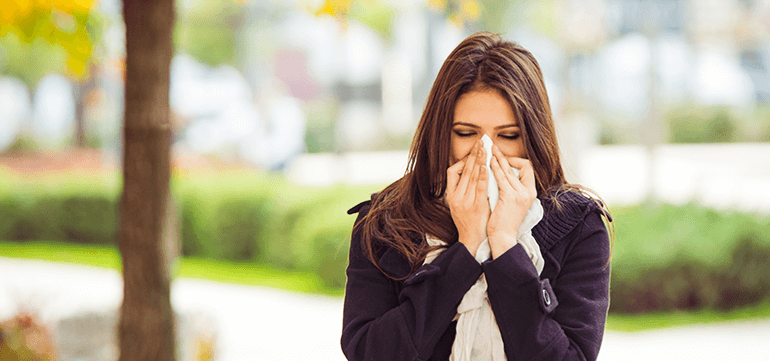What We Treat:
Could My Itchy Eyes, Runny Nose, & Sneezing be Seasonal Allergies?
Do you have itchy, watery eyes? Are you always sneezing when you walk outside? Do you feel drainage in the back of your throat? If so, then you may be experiencing seasonal allergies, also known as hay fever of allergic rhinitis. Seasonal allergies are the inflammation of the lining of the nose.
Causes
It is due to a histamine response from the body when you come in contact with tree pollen, cut grass, weeds, or other seasonal airborne pollens. Allergies can also be all year long. They are usually harder to diagnose and treat than seasonal allergies. They may require a visit to an allergist to perform allergy testing. An allergy test will tell you exactly what you are allergic to so you can make changes to your lifestyle to prevent the allergies from occurring. Allergies can also be related to mold, animal dander or hair, dust, dust mites, cockroaches, and food. Food allergies are common in children but more uncommon in adults. Seasonal allergies are not contagious.

Common Symptoms of Allergies
There are common symptoms of seasonal allergies that most people experience. Some people, unfortunately, experience all the symptoms while others only experience a few.
Common Symptoms of Allergies Include:
- Sneezing
- Itchy, watery eyes
- Runny nose
- Itchy, scratchy throat
- Nasal congestion
- Itchy ears
- Post nasal drip
- Coughing
Who is at Risk for Seasonal Allergies?
There are many allergy sufferers worldwide, and the occurrence of seasonal allergies is increasing yearly. Seasonal allergies are common in children. Kids usually develop symptoms between the ages of ten and twenty. Parents will notice their child has puffy eyes and a dark discoloration or bruising under their eyes called allergic shiners. They also may breathe from their mouth more often and have a nasal salute which is where the child wipes their nose so much in an upward fashion that their nose cartilage starts to crease near the bridge of their nose. Others that are at risk for seasonal allergies are those that:
- Go to summer camp
- Work outside
- Gardeners and landscapers
- Individuals with asthma
- Travelers as they are always in different and changing climates and environments
- Those that live in a highly pollinated area such as the southeast
What Will My Doctor Ask Me?
Your doctor is going to ask you a bunch of questions regarding your symptoms. They are going to ask such questions as when you noticed the symptoms, how long you have been experiencing the symptoms, when they are better and when they are worse. They are also going to ask you what season they worsen in and what you are doing when you notice them. Other questions your doctor may ask you regarding your seasonal allergies are:
- What triggers the symptoms? Going outside? Pets? Specific odors?
- If you suffer from sneezing, itchy, watery eyes, scratchy throat, runny nose, constantly clearing your throat or nasal stuffiness.
- They will ask about the color, consistency, and amount of nasal drainage as well as how the symptoms affect your life. Do you have to stay in the house all day? Do you call out of work on the worst days?
- Your doctor may ask you if anyone in your family suffers from the same symptoms.
- Lastly, your doctor may ask you what you have tried in the past (both medications and home remedies) to make your symptoms better.
How Do I Treat My Allergies?
If your doctor determines you have seasonal allergies, they will get you on some daily medications to prevent your symptoms from occurring. If it is determined that your allergies are more difficult to diagnose, your doctor will give you a referral to an allergist who will perform skin testing to see exactly what you are allergic to. Once those results are in, your doctor and allergist can make a plan of care to treat and prevent your allergy symptoms.
Seasonal Allergy Treatment
Seasonal allergies are a chronic or long-lasting illness. Your doctor’s goal is to prevent nasal inflammation to reduce the incidence of you developing such conditions as asthma, chronic sinus infections as well as ear infections.
Preventative Measures
There are many things you can do to control the allergies you come in contact with, both in the home and outside of your living area. These measures include:
- Vacuum and wet mop weekly
- Dust furniture weekly with a damp rag
- Wash sheets and blankets weekly
- Do not open the windows in spring or summer; keep the air conditioning on
- Use an air purifier
- Do not have pets. If you already have a pet, wash them weekly
- Use clothes dryer instead of clothing line outside
- Eliminate any dust mites or cockroaches
- Reduce humidity in the home to under fifty percent
Medication Treatment
When you are unable to avoid allergens, medications will need to be prescribed that you take on a daily basis. Your doctor will take your symptoms, the cost, and any side effects in consideration before he/she prescribes you medication. Common allergic rhinitis medications that your doctor may prescribe are oral antihistamines such as Zyrtec, Allegra, or Claritin. There are also nasal sprays that have been quite helpful in people with allergic rhinitis/seasonal allergies. Your doctor may prescribe you one of these medications as well: Nasonex, Flonase, or Nasacort.
What Do I Need to Know About Seasonal Allergies? – Patient Education
- Allergen avoidance is the most efficient form of treatment.
- Try to eliminate dust and allergen exposure in the household.
- The bedroom is considered the room that needs to be free of allergens as that is where you or your loved one sleeps.
- Untreated severe seasonal allergies can turn into a sinus infection which will need antibiotics.
Emergency Warning Signs/When to Follow Up
- Follow up with your doctor quarterly for rechecks of your seasonal allergies and to make sure you are symptoms-free.
- If you or your child has food allergies (nuts, peanuts, shellfish, red dye), be sure to go to the emergency room if an allergic reaction (difficulty breathing, hives, panic, shortness of breath, throat or mouth swelling) occurs.
Why Choose Carefree M.D.?
Carefree M.D. is a safe, secure and reliable way to receive a medical consulation or prescription for your allergies online. We connect you via webcam* or phone with a local board certified doctor.
- One card works for your entire household
- Unlimited 24/7 access to board certified doctors
- No paperwork or waiting-you can use it today
- Month-to-month service with no contracts
Join Today
*Idaho and Delaware only allow video consultations. The state of Arkansas offers an initial video visit and the member may choose phone or video for subsequent visits.

Have Questions?
Call 888-899-8297 or visit our contact page.


